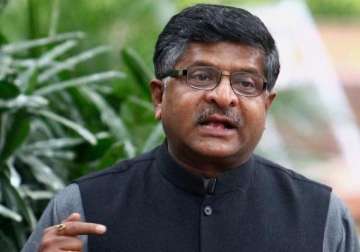New Delhi: In a bid to reinvigorate the postal department by linking it with booming e-commerce, IT and Communications Minister Ravi Shankar Prasad is scheduled to meet heads of Amazon India and Flipkart this week.
Amazon India Vice-President and Country Manager Amit Agarwal and Monique Meche, Vice President of Global Public Policy at Amazon are scheduled to meet Prasad on Tuesday.
Flipkart co-founder and CEO Sachin Bansal is also expected to meet the minister on November 13, sources said.
They said the agenda of the meeting is to discuss the ways in which India Post, world's largest postal network, can be utilised by e-commerce players to deliver goods across the country.
Prasad, they said, is of the view that with its unparalleled rural reach, India Post would be best suited to offer delivery services to e-commerce players.
The government is also looking at using e-commerce to improve the efficiency of postmen, and contemplating ways to incentivise them for timely delivery of goods.
"The postmen are expected to get some reward for timely delivery of products, although its just an idea as of now," said a source.
India Post has over 1.55 lakh post offices of which more than 1.39 lakh are in the rural areas. On an average, a post office serves an area of 21.21 sq. km and a population of 7,175 people.
According to market analysts, last-mile delivery of products ordered by online shoppers will figure as one of the major deciding factors for e-commerce firms like Flipkart, Snapdeal, Amazon and so on.
These firms offer one-day delivery to their clients and the demand is expected further intensify as they are investing hugely in logistics to ramp up their delivery system.
The opportunity in back-end logistics for online shopping segment is estimated to be about Rs. 3,500-4,000 crores, a major part of which is last mile delivery.
According to a joint study by consultancy firm PwC and industry body Assocham, the size of the e-retail industry is poised to touch $10-20 billion by 2017-2020 and e-commerce firms are expected to spend up to $1.9 billion by 2017-2020 on infrastructure, logistics and warehousing.
Latest Business News
